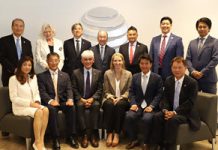To develop U.S. negotiating positions, the Office of the U.S. Trade Representative (USTR) held a public hearing yesterday regarding a proposed United States-United Kingdom Trade Agreement, including U.S. interests and priorities.
The hearing was a part of the public notice and comment process following USTR’s notification to Congress on October 16, 2018 of the Trump administration’s intention to enter into negotiations with the United Kingdom for a U.S.-U.K. Trade Agreement after the U.K. has exited the European Union.
Background
The United Kingdom is the fifth largest economy in the world, with the U.S. being the first. The U.S. maintains a deep trade and investment relationship with the U.K. Presuming the U.K. leaves the European Union in March, the two countries will be able to enter into formal free trade agreement (FTA) negotiations.
Impact
Two-way trade between the United States and the United Kingdom was $109.4 billion in 2017 and the U.K. was the fifth largest importer of U.S. goods with a total value of $56.3 billion.
The United Kingdom is California’s 10th largest export destination, with more than $5 billion in exports. Computer and electronic products accounted for approximately 25.7% of exports—more than $1.29 billion. Transportation equipment brought in $704 million, or 14%; while both second-hand merchandise and chemicals accounted for 10.8% and 9.2%, respectively.
In 2017, imports into California from the United Kingdom were approximately $5.5 billion, with the top categories being transportation equipment and chemicals.
Per the U.S. Department of Commerce, the U.S.-U.K. investment relationship is the largest in the world, valued at more than $1 trillion in 2016 and creating over two million jobs, about one million in each country.
More than 42,000 U.S. firms export to the U.K. Annual U.S. exports to the U.K. are valued at more than $100 billion.
British investment is key in the U.S. More than a million Americans go to work every day for British companies. Similarly, one million Britons go to work for America companies every day. British investment is specifically vast in California, where it supports approximately 105,000 jobs and the number of U.K. subsidiaries exceeds 1,000. (British Consulate General, San Francisco, 2012). The U.K. contributes 19% of the foreign direct investment (FDI) into California, more than double that of any other country.
U.K. FDI in the United States contributed $7.9 billion to research and development and an additional $43.1 billion to expanding U.S. exports. The top industry sectors for British FDI in the U.S. are: business services, software and information technology services, financial services, communications, industrial machinery, and textiles. (Select USA)
Previous Activity
In July 2017, U.S. Trade Representative Robert Lighthizer and U.K. Secretary for International Trade Dr. Liam Fox established the U.S.-U.K. Trade and Investment Working Group. The Working Group was established to provide commercial continuity for U.K. and U.S. businesses, workers and consumers as the U.K. leaves the European Union. The working group has laid the groundwork for future FTA negotiations as it has explored ways the two countries can collaborate to promote open markets and freer and fairer trade around the world.
The working group met five times by the end of 2018 and a more recently created U.S.-U.K. Small and Medium-sized Enterprises (SME) Dialogue has convened three times.
Anticipated Action
The California Chamber of Commerce is hopeful that the U.S. and U.K. will begin FTA negations as soon as the U.K. formally exits the European Union. The CalChamber supports the goal of strengthening the trading and investment relationship between the two countries, with a focus on securing open market access. The CalChamber supports the following issues being discussed during negotiations:
- market access for goods;
- data protection and data transfers;
- financial services;
- intellectual property rights;
- movement of labor; and
- regulatory cooperation.
CalChamber Position
The CalChamber, in keeping with long-standing policy, enthusiastically supports free trade worldwide, expansion of international trade and investment, fair and equitable market access for California products abroad and elimination of disincentives that impede the international competitiveness of California business.
Strengthening economic ties and enhancing regulatory cooperation through agreements with our top trading partners that include both goods and services, including financial services, is essential to eliminating unnecessary regulatory divergences that may act as a drag on economic growth and job creation.
Agreements like this have the capability of ensuring that the United States may continue to gain access to world markets, which will result in an improved economy and additional employment of Americans.
Staff Contact: Susanne T. Stirling

